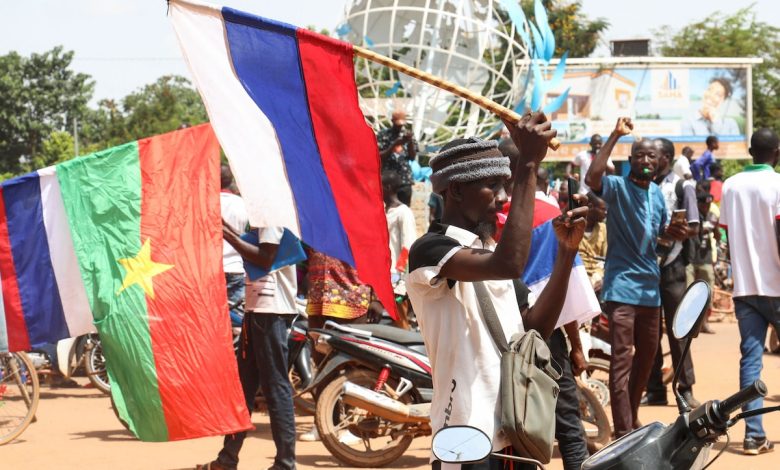Is Ukraine Seeking to Open a New Front Against Russia in Africa?

By Safwan Julak
Kyiv – In its quest to bolster its growing presence in Africa and mitigate the effects of severed relations with African countries, Ukrainian Foreign Minister Dmytro Kuleba conducted a new tour of the continent, which included visits to Malawi, Zambia, and Mauritius.
This visit, Kuleba’s fourth to Africa since the outbreak of war with Russia, coincides with Mali and Niger cutting ties with Ukraine, accusing it of supporting rebels against their forces and the Wagner mercenaries backing them.
Over two years of war, Kuleba has visited 12 African countries, while Russian Foreign Minister Sergey Lavrov has visited 14. This reflects a fierce competition between Kyiv and Moscow for influence and interests in the continent, according to observers.
After the collapse of the Soviet Union in 1991, Moscow inherited all diplomatic institutions in Africa; Kyiv accepted this division without much objection at the time. For 30 years before the war, Ukraine only had embassies in 10 out of 54 African countries.
However, the war Russia launched on Ukraine seemingly reminded Kyiv of the importance of that part of the world. During two years of war, Ukraine has taken significant steps to expand its network of relations, opening 10 new embassies in African countries, which Moscow views as a “second front” against it.
Importance of Africa
The countries where Kyiv has opened new embassies have received hundreds of thousands of tons of Ukrainian grain under the grain agreement, initially brokered by the United Nations and Turkey between Russia and Ukraine. Later, this was part of the “Grain Initiative,” launched independently by Ukraine, which limited Russia’s “monopoly” on the African grain market, according to experts.
Ukraine has also signed visa-waiver agreements with some African countries, as was the case recently with Mauritius during Minister Kuleba’s visit.
Roman Bryadon, a writer for the Ukrainian newspaper “Obozrevatel,” believes that Africa is important to Ukraine because it opens vast opportunities. Some African countries are experiencing significant economic growth, and they have a large, young consumer market. According to the United Nations, by 2050, “a quarter of the world’s population will live in Africa.”
Bryadon told Al Jazeera that “the influence of African countries on the international stage is increasing, as the 54 African countries make up 28% of the United Nations’ 193 members. The African Union is seeking a seat on the United Nations Security Council and is already a member of the G20.”
Bryadon highlights the weight of African politics on the international level for Kyiv, saying, “More than half of the continent’s countries typically vote in favor of decisions that benefit Ukraine, while others abstain to maintain neutrality or avoid creating tensions with Russia.”
In this context, Ghana, Liberia, Niger, and Côte d’Ivoire joined the “Crimea Platform” conference in 2022, aimed at returning Crimea to Ukrainian control. Kenya, Liberia, Morocco, and Tunisia joined the group supporting Ukraine’s defense under the “Rammstein Format” (a contact group for the defense of Ukraine that first met in Rammstein, Germany). Additionally, 10 African countries supported excluding Russia from the United Nations Human Rights Council, although none have imposed sanctions on Russia since the war began, Bryadon said.
The Ukrainian writer believes that “Kyiv needs to change this equation in its favor, vigorously counter Russian disinformation in Africa, and increase its diplomatic presence while encouraging Ukrainian companies’ activities on the continent.”
Gateway to the Silent World
The Russian war on Ukraine was a shock to the African continent, particularly as it disrupted traditional food supply routes and sharply increased prices.
Experts believe that Africa is the best gateway for Ukraine to sway the “silent world” against Russia and change the stance of most Asian and Latin American countries as well.
Victor Timofeev, a writer for the website “Korotko,” said, “African leaders are increasingly interested in an early end to the war and generally understand the reality of the situation and the consequences of Putin’s actions.”
Timofeev told Al Jazeera that the “2023 Russia-Africa summit provided positive indicators for Ukraine, as it only included 17 heads of state from the continent, compared to 43 in the 2019 summit.” He sees this as paving the way for changing positions and even leading to pressure and sanctions on Russia.
A Front to Strike Interests
The African continent is a profitable front to strike Russian interests, which are far larger in scale and scope than Ukraine’s, though this will not be easy.
Timofeev said, “Africa is now a gold mine for Russia, providing it with illegal black income. There are several countries under Russian control in Africa that directly give money to the Kremlin, along with the ability to extract gold, diamonds, and other minerals.”
He continued, “Removing Russia from African countries is a matter of geopolitical prestige for Ukraine, and limiting Moscow’s ability to renew resources for its ongoing war.”
Although Kyiv denies adopting such an approach, many do not rule out the possibility that Ukraine might support any movement against Russian military influence in Africa, even if it negatively impacts relations with some African countries. Bryadon said, “With Russian support, military councils carried out coups and came to power in some African countries, and they are trying to defend themselves with the help of Russian trainers and Wagner mercenaries.”
Bryadon believes this is possible for Ukraine and could lead to “rapprochement with France,” whose relations with those countries have deteriorated, and could also be a source of relief for China, which seeks broader influence, conflicting with Russia’s significant presence in Africa.
Source: Al Jazeera



